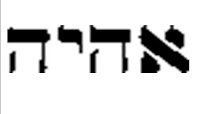The
Creator’s/God’s name appears almost 7,000 times in the original Hebrew
Scriptures (the Old Testament). It appears 8 times, just in the 10 Commandments.
One of the most fundamental and essential features of
the biblical revelation is the fact that God is not without a name: he has a personal name, by which he can, and
is to be, invoked.” (The New International
Dictionary of New Testament Theology.
Vol. 2. p. 649)
I have produced a man with the aid of
Genesis 4:1
By the time Moses was born, the scriptures imply that no one remembered the Creator’s/God’s Name. In the original Hebrew Scriptures, the Creator’s/God’s name was given to Moses on Mount Sinai, as being .
(Exodus 3:14). These 4 letters make up what is called the Tetragrammaton.
Christians later changed the Tetragrammaton to
(YHWH)
And God
proceeded to speak all these words, saying:“I am
your
God, who have brought you out of the land
of Egypt, out of the
house of slaves. You must not have any other gods against my face. Exodus 20:1-3
Then Moses
said to God, "If I come to the people of Israel and say to them, 'The God of
your fathers has sent me to you,' and they ask me, 'What is his name?' what
shall I say to them?" God said to Moses, "I AM that I AM". And he said, "Say this to the people of Israel,
YHWH has sent me to you.'" God also said to Moses, "Say this to the
people of Israel, 'I Am, the God of your fathers, the God of Abraham, the God
of Isaac, and the God of Jacob, has sent me to you': this is my name for ever,
and thus I am to be remembered throughout all generations. When Moses first
spoke with God, God said, 'I used to appear to Abraham, Isaac, and Jacob as El
Shaddai (El: One of God’s earliest
names; Syrian tablets with this name have been traced back to 2300 BC; “I AM”),
but I did not make myself known to them by My Name YHWH. Exodus
3:13-15, 6:3.
Most modern day translations render the Tetragrammaton as either YHWH or JHVH.
The
truth is, no one knows for sure how the Creator’s/God’s name is/was originally
pronounced. Although much confusion remains as to the
correct English pronunciation, most modern day Bible translators render the
pronunciation of the Creator’s/God’s
name as "Yahweh” or “Jehovah.”
The Church of Yahweh renders the following paraphrased
hypothesis:
Originally, Hebrew did not have vowels. Eventually the
Hebrews felt it was wise to insert little dots (called vowel points) around the
letters to remind the reader of the exact pronunciation. When they came to YHWH
in the text, they added the vowel points for Adonai ("Lord") to
remind the reader that the Divine Name was not to be pronounced. In the Middle
Ages, around 1500, translators misunderstood that the vowel points were for
"Adonai", not "Yahweh". Thus, they combined the
letters of YHWH with the vowels of Adonai. The result was "Jehovah" …
the etymological fact is that "Jehovah" is a mistranslation based
upon a historical misunderstanding. In our modern Bibles, then, whenever
YHWH is found, we usually "translate" it as LORD or Jehovah. Both are
wrong, though Jehovah is certainly
preferable to LORD.
Jehovah’s
Witnesses support this hypothesis.
When it came to God’s name, instead of putting the
proper vowel signs around it, in most cases they put other vowel sounds to
remind the reader that he should say ‘Adho-nai’. From this came the spelling Iehouah, and,
eventually, Jehovah became the accepted pronunciation of the divine name in
English. (The Watch
Tower Bible and Tract Society of Pennsylvania. The Divine Name That Will Endure Forever. 1984.
p. 8)
Does it really
matter whether we pronounce the Creator’s/God’s name as Yahweh or Jehovah? Not at all; if it, the pronunciation, really
mattered, the Creator/God certainly would have seen to it that it was preserved
by at least one prophet! The important
thing is to know that the Bible does indeed, tell us that the Creator/God has a
personal name and we should not only be aware of it, but also use it and share
it with others.
Those knowing your name will trust in you … Psalm 9:10
Let your name be sanctified. Matthew 6:9
I have made your name known to them and will make it
known, in order that the love with which you loved me may be in them and I in
union with them. John 17:26
So it is, sealed
in trust, faith and truth, in the Sacred Divine Light of Jesus. Amen
Please leave any comments to this discourse on our Facebook Page.


